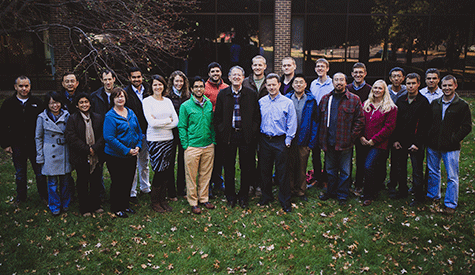Jeffrey I. Gordon, MD, director of the Center for Genome Sciences and Systems Biology, has won the 2014 Passano Foundation Award for his pioneering studies demonstrating how the trillions of microbes that live in the gut influence human health.

The annual award, established in 1943, recognizes a scientist in the United States who has made outstanding contributions to the advancement of medical science. The award focuses on work that has immediate clinical value or holds promise of a practical application in the near future.
In announcing the award, the foundation noted that Gordon’s discoveries have broad implications for 21st-century medicine and have fundamentally changed the way we understand human biology. His work has emphasized how humans are a composite of microbial and human cells and genes and that our microbial communities (microbiota) and their microbial genes (microbiome) endow individuals with attributes and capabilities that are not specified by their human genes.
Gut microbes play important roles in the digestive system, where they aid in digestion, guide metabolism and break down and synthesize nutrients and vitamins. Microbes in the gut also are thought to be highly influential throughout the body, where they help shape the immune system, the wiring of the brain and cardiovascular health.
Gordon’s lab has focused on two global health problems: obesity in Westernized countries and severe forms of childhood malnutrition that occur most often in poverty-stricken countries. His studies have revealed that the nutritional value and metabolic effects of the foods people consume are connected intimately to the workings of their gut microbial communities.
Much of what has been learned about the varied roles of human gut microbes in health and disease comes from Gordon’s studies of mice born and raised under sterile conditions. By colonizing the mice with gut microbiota from people of different ages and cultural traditions who consume different diets, he and his students have shown that a person’s physiology, metabolism and immunity are influenced, at least in part, by their gut microbes.
In feeding these mice human diets, the Gordon lab also has defined how various diets alter gut microbial communities. This avenue of research highlights the potential for translating research findings from the laboratory to populations of people, including those who are obese or malnourished.
Much of Gordon’s research involves studying the gut microbiota of twins in which one is healthy and the other suffers from malnutrition or obesity. This approach helps neutralize the effects of genetics and environment.
In a study of young twins in Malawi, Gordon and his students transplanted into previously germ-free mice the gut microbiota from healthy or malnourished twins, establishing that “sick” communities of gut microbes are an underlying cause of severe acute childhood malnutrition. They also showed that microbial communities of malnourished children don’t develop normally after birth.
With support from the Bill & Melinda Gates Foundation, Gordon and his team are seeking to develop innovative ways to repair gut microbial communities in malnourished children to ensure their healthy growth. One path they’re exploring involves identifying next-generation therapeutic foods and new probiotics from the gut communities of healthy individuals that could be given to malnourished children.
Gordon’s lab also has shown that obese individuals have gut microbial communities that are less diverse than their peers who are lean. They theorize that this lack of diversity is associated with microbial “job vacancies” related to the onset and perpetuation of obesity and its related metabolic abnormalities.
Again studying twins in which one is lean and the other obese, Gordon and his students have shown they can recapituate in mice that have had gut-microbiota transplants the body composition and metabolic features of the human microbe donor, whether that person is obese or lean.
They have gone on to identify gut microbes from lean individuals that can fill job vacancies in the obese microbiota and that prevent the development of obesity and metabolic abnormalities in mice destined to gain weight. Further, the researchers have shown that the ability to fill these job vacancies appears to be contingent upon eating a healthy diet.
Gordon notes that the germ-free mice provide a platform for discovering specific dietary ingredients and collections of naturally occurring gut microbes that one day could be used to help prevent or treat obesity, a growing global health problem.
Gordon’s lab also is using the germ-free mice and human-to-mouse microbiota transplants to determine how particular foods influence the health of the gut microbiota and the body. Gaining this knowledge is important for creating foods to enhance human health, especially given the challenges of population growth and sustainable agriculture and changing food preferences brought about by globalization.
Gordon believes that studies of human gut microbial communities have the potential to alter the established views of human nutrition and could catalyze efforts to integrate agricultural policies and practice, food production and nutritional recommendations for consumers based on age, geography, culture and health status.
He also thinks that studies of human microbial ecology provide new opportunities for students to identify ways to address some of the world’s most vexing health problems.
Gordon earned his bachelor’s degree from Oberlin College and a medical degree from the University of Chicago Pritzker School of Medicine. He joined the School of Medicine faculty in 1981 and has spent his entire career at Washington University. A champion of interdisciplinary education, Gordon has mentored 120 PhD and MD/PhD students and postdoctoral fellows in his laboratory.
He is a member of the National Academy of Sciences, the American Academy of Arts & Sciences, and the Institute of Medicine of the National Academies. In 2013, he received the Selman A. Waksman Award in Microbiology from the National Academy of Sciences and the Robert Koch Award from the Koch Foundation in recognition of his central role in establishing the field of human microbiome research.

Washington University School of Medicine’s 2,100 employed and volunteer faculty physicians also are the medical staff of Barnes-Jewish and St. Louis Children’s hospitals. The School of Medicine is one of the leading medical research, teaching and patient-care institutions in the nation, currently ranked sixth in the nation by U.S. News & World Report. Through its affiliations with Barnes-Jewish and St. Louis Children’s hospitals, the School of Medicine is linked to BJC HealthCare.